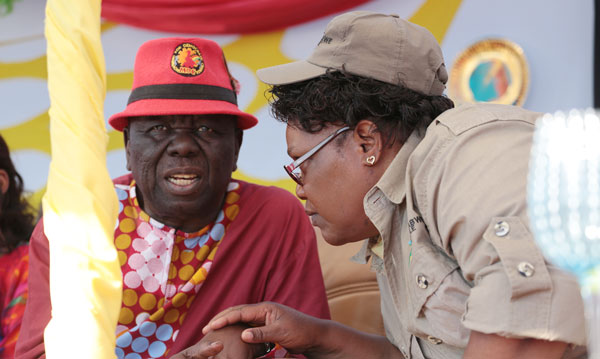
TWO months ago former vice-president Joice Mujuru and ex-Prime Minister Morgan Tsvangirai breathed life into Zimbabwe’s opposition politics when they held hands as they marched in Gweru against President Robert Mugabe’s rule.
BY OBEY MANAYITI
The march re-ignited hopes that the so-called grand coalition mooted by the opposition to finally stop the 92-year-old leader from winning another term in 2018 was now close to becoming a reality.
A few weeks later Tsvangirai’s MDC-T and Mujuru’s Zimbabwe People First (ZimPF) joined other parties in protests that shook Zanu PF to the core, leading to an unprecedented ban on demonstrations in the capital Harare for a month.
The National Electoral Reforms Agenda (Nera) appeared to be the perfect platform for the anti-Mugabe alliance. Tsvangirai and Mujuru became more forceful in preaching the gospel of unity.
However, events in the past week have revealed that the coalition might have just been a pipe dream, with opposition parties trading insults over defections by members, especially to ZimPF and MDC-T.
Tendai Biti’s People’s Democratic Party (PDP)— the most vocal advocates for a coalition— lost several of its top officials to both parties.
As it licked its wounds, the PDP questioned ZimPF’s sincerity after Biti’s deputy Samuel Sipepa-Nkomo crossed the floor to join Mujuru’s party.
- Chamisa under fire over US$120K donation
- Mavhunga puts DeMbare into Chibuku quarterfinals
- Pension funds bet on Cabora Bassa oilfields
- Councils defy govt fire tender directive
Keep Reading
Talk was that coalition negotiations with the parties were now dead — an assertion that was, however, dismissed by PDP spokesperson Jacob Mafume.
“A coalition is not optional, but it is a must,” he said.
“The personal movements of some individuals do not hold back the country from going forward. And you in the media must help us as politicians to avoid this personal grandstanding because the country is on fire and it needs serious political movements not the shifting of persons like offals in a dish.”
Mafume said PDP was proud to see the scramble for its members by other parties, claiming it showed the amount of talent within its rank and file.
However, Mafume warned parties “poaching” from PDP, saying the defections would not add any value to their organisations.
“These movements do not add anything to the collective opposition, but simply the same as re-arranging the furniture in the house,” he said.
“So when they do the mathematics, they will soon realise they are running on the same spot like a runner on a treadmill going nowhere but looking at pictures of kilometres on a machine.”
MDC-T spokesperson Obert Gutu insisted coalition talks were going ahead despite seemingly bad blood among the leaders.
“The formation of a coalition is a process and not an event. It is about shared values, ethos and principles and not about positions. Talks are on-going and in the fullness of time, the people of Zimbabwe will be advised,” Gutu said.
Gutu also dismissed as unsubstantiated reports that MDC-T and ZimPF were only trying to form a coalition among themselves hence targeting people they were interested in from other parties, including the PDP.
“That’s absolute nonsense, pure unadulterated hogwash. The MDC is a very strong and appealing brand and people are coming in their thousands to join us each and every day. We are not responsible for the cataclysm in the PDP,” he said.
“In fact, we don’t belong to the same league with that party. You cannot compare a big premier league football team with a small social soccer club! It doesn’t work out that way.”
ZimPF spokesperson Jealousy Mawarire weighed in, saying nothing would derail the proposed coalition.
“A coalition does not stop an individual party programme. If we believe we are all democratic parties, what is the fuss about where one comes from in a coalition,” Mawarire said.
“We can say this is an internal movement and it shouldn’t be a cause for concern because it doesn’t reduce the number of people in a coalition. There is no reason to panic.
“The coalition is going ahead and it is not affected by these movements.”
But political analyst Eldred Masunungure said it was unlikely that the parties would find each other again.
“I have been one of the people who didn’t express hope on the grand coalition,” he said.
“The struggle of leadership of the grand coalition is too hot and deeply rooted and I don’t see it flying. Even if it flies, it will not go far. We are seeing it suffering a stillbirth.”
He said ZimPF and PDP were the closest to sowing seeds of a coalition but recent events showed that the parties were drifting apart.
“This is an endgame to attempts of forming a grand coalition,” Masunungure said.
Another political analyst, Pedzisai Ruhanya said the grand coalition was unlikely because of the contestation for power among opposition parties themselves rather than the will to transform.
“If the grand coalition is premised on the will to get power and not the will to transform, the will to democratise our politics, then it won’t succeed,” he said.
“A grand coalition needs people who are prepared to sacrifice their parochial need for power and focus on the transformative redemptive agenda to democratise our national politics.”
There are fears that if opposition parties fail to find each other before 2018, they will divide the vote and play into Zanu PF’s hands.









